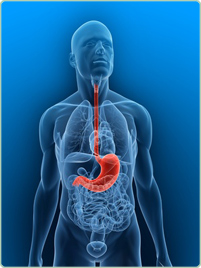 Esophageal cancer is the cancer of the esophagus, the food pipe that connects the throat to the stomach. The incidence of esophageal cancer is rising dramatically in the United States with a significant increase among those ages 45-65.
Esophageal cancer is the cancer of the esophagus, the food pipe that connects the throat to the stomach. The incidence of esophageal cancer is rising dramatically in the United States with a significant increase among those ages 45-65.
Unfortunately, esophageal cancer is too often discovered late and survival is very poor. However, with proper screening and careful attention to symptoms, early detection is possible with excellent chances for cure.
Symptoms of early esophageal cancer may be very subtle. Symptoms may include heartburn, chest pain, or difficulty swallowing. As the disease progresses, patients may feel worsening of swallowing problems, anemia, weight loss or vomiting blood.
Gastroesophageal Reflux (GERD) or heartburn remains the single most important risk factor for esophageal cancer. Barrett’s esophagus, a condition that may lead to esophagus cancer, occurs as a result of many years of reflux symptoms and increases the risk of esophageal cancer by 30 folds.
Other risk factors include obesity, smoking, and a diet low in fiber, fruits and vegetables. Prevention and treatment of acid reflux is important and can decrease the risk of esophageal cancer. In patients with chronic heartburn, an upper endoscopy can screen for conditions such as Barrett’s esophagus that may lead to esophageal cancer in the future.
Dr. Mehdizadeh is a gastroenterologist in Beverly Hills and an attending physician at Cedars-Sinai Medical center and has performed thousands of endoscopic procedures and is experienced in diagnosis of disorders of digestive system including esophageal cancer, acid reflux or Barrett’s esophagus.
